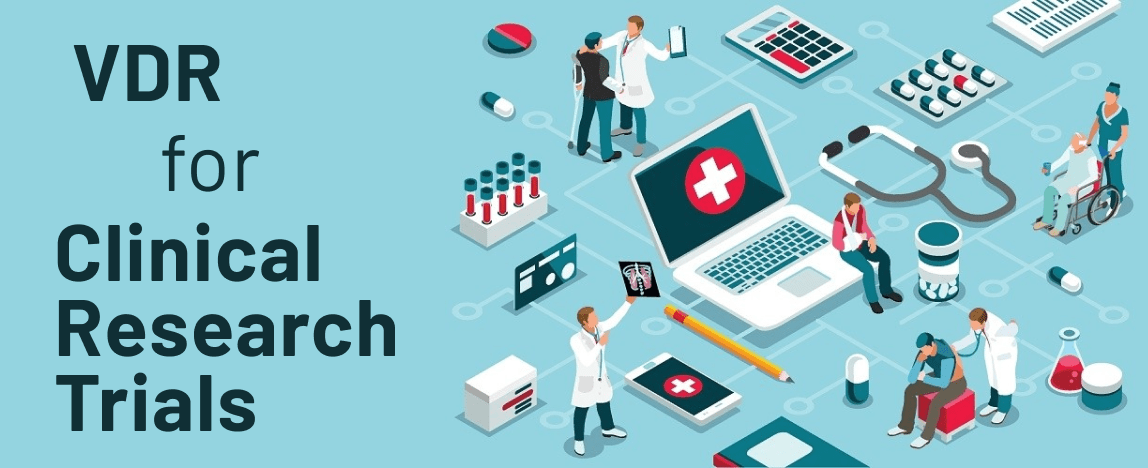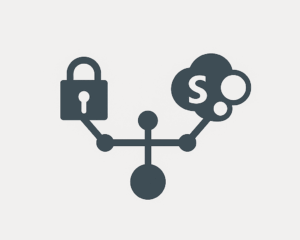

With pivotal clinical trial costs ranging from $48 million to $225 million, there’s ample room for expenditure reduction. Yet, a significant portion of these costs lies in the exchange of data during trials – an often underestimated expense.
Luckily, a healthcare data room can save the day for organizations that carry out data-heavy projects. VDRs are specifically designed to secure intellectual property, help with company data management, and ensure security regardless of the data size and privacy needs.
Thus, a VDR can aid healthcare organizations in managing and sharing files across their organization as well as clients and customers — all in a secure and cost-effective way.
Benefits of a virtual data room for clinical research trials
According to the paper by the BMC’s Journal for Medical Informatics and Decision Making, most healthcare and clinical research organizations are facing the challenge of reproducing some of the work done by fellow research institutes due to the absence of a standardized data protocol.
A virtual data room provider resolves this issue, offering standardized, transparent, and fully manageable space for secure file-sharing during clinical trials.
Let’s discover how life sciences and biotech companies can reduce costs and improve efficiency by utilizing a secure virtual data room for life sciences with confidence and ease.
Security of confidential documents
With lots of IP management required and a large volume of important documents sourced from volunteers, safe handling of these documents is paramount. Volunteers who decide to partake in the trials want the assurance that their personal information will not be disclosed to the public.
A healthcare virtual data room ensures data privacy through robust encryption, which is essential when handling confidential medical records and research findings. This end-to-end encryption, with advanced algorithms like AES-256, protects patient identities and health information from unauthorized access, which makes it fully HIPAA compliant.
Revoked access to information
Clinical research often involves multiple stakeholders, such as pharmaceutical companies, research institutions, and regulatory bodies. VDRs facilitate seamless collaboration and secure data sharing by offering controlled access. Researchers can share legal documents with designated individuals or teams, ensuring that only authorized personnel can review or contribute to the study.
Apart from granting access, healthcare data rooms make it easy to revoke access at any time. Research organizations might sometimes have internal issues with staff who have been granted access to personal and sensitive information in the data room. A staff member who is obviously pained by the fallout can decide to leak sensitive information to the public. With a VDR, access rights can be revoked at any time, allowing flexibility with security that can fluctuate with any given situation.
Easy regulatory approval
VDRs also support the regulatory communications process in clinical trials. They enable the efficient organization and retrieval of documentation, ensuring that all necessary files, such as study protocols, informed consent forms, and adverse event reports, are readily available for regulatory review. This expedites the approval process and reduces the time spent on clinical trials, potentially accelerating the development of life-saving treatments.
Watermark feature
In the event that photos or data in the virtual data room are leaked before access can be revoked, the watermark feature is always there. A watermark ensures that wherever the document ends up, it will always bear the organization’s name and raise questions.
A watermark is very difficult to erase and any purpose that the hacker intends to use it for will be defeated because the watermark invalidates any claimed authenticity. Also, each user is assigned a unique watermark, which comes in handy if an organization intends to take legal action against the perpetrator.
Remote access and Q/A feature
With a virtual data room, external parties can have access to information on clinical research from anywhere in the world without having to be present at the organization. The question-and-answer feature helps to bridge the gap of virtual interactions by ensuring external parties can engage in conversations with the organization and get answers to any questions they might have.
Drugs licensing
With virtual data room software, biotech licensing is made easier because it enables relevant medical authorities across the world to access the licensing agreements on the drug. After the assessment, due diligence and market research can be carried out to seek approval of the drug, so that potential investors can further support its commercial strategy and introduce it to the market.
Access permissions
Virtual data rooms can also grant access to specific users. Thus, no unauthorized person or external party has access to the information on the data room other than those with permission.
When it comes to transparency, the virtual data room is unparalleled in its function.
Top trusted virtual data rooms for clinical trials
Clinical research data is especially prone to security breaches given the privacy concerns of personal information involved. The title of an article recently written by Caroline Humer and Jim Frinkle that appeared in Reuters says it all: “Your Medical Record Is Worth More Than Your Credit Card to Hackers.”
With such quantities of data involved, security firewalls are more prone to attack. This also makes every participating group in the clinical research and subsequent trial vulnerable to a cybersecurity attack. Thankfully we live in a digital era where lots of digital tools and resources are available to enhance security and privacy in clinical research. The security of the virtual data rooms is guaranteed by international electronic data security certificates.
With this imposing threat in view, an optimal reputable system like the virtual data room presents a perfect port of call for the privacy and security needs of clinical research.
Below are the top three virtual data room solutions that offer the most suitable feature set for clinical research and life science:
| Provider | Top clinical research features |
| Ideals | - Strong encryption for patient data and research findings – Controlled access for secure collaboration – Document organization and retrieval for regulatory approval – International data-sharing capabilities – Comprehensive audit trail functionality |
| Firmex | – Advanced security protocols, including encryption – Secure access controls for data confidentiality – Document versioning and tracking for audit purposes – User-friendly interface for seamless collaboration – Customized data permissions to restrict access as needed |
| Intralinks | – Encryption and secure infrastructure for data protection – Permission settings for granular access control – Content management tools for regulatory compliance – Global data sharing and collaboration capabilities – Detailed reporting and auditing features for transparency |
Tips for choosing a virtual data room for clinical research
Due to the ever-growing popularity of virtual data rooms in the clinical research market, it may become more difficult to choose the right opinion. Below are a few considerations to start with in your choice:
- Identify your data sharing needs: Determine what data you need to share, both internally and externally. Some data may need to be shared with external parties, such as collaborators or regulatory authorities.
- Check access permissions: Decide who on your team requires access to specific information and why. This will help you choose a VDR with suitable access control features to accommodate both internal and external data access needs.
- Consider access restrictions: Implement access restrictions to control who can view and edit sensitive data. This is particularly important for patient information.
- Mind data redaction: Identify data that is sensitive and should be redacted. Patient personal information, for example, must be safeguarded at all costs.
- Select a secure VDR: Choose a VDR that offers redaction features to protect patients’ sensitive information from unauthorized access while allowing access for research purposes.
Apart from the selection of a data room, there are many more challenges associated with integrating this solution into your clinical practice. Let’s overview them quickly.
- Scalability and flexibility: Choose a VDR that can scale with your needs. Ensure it supports multiple users and allows you to customize access permissions and data organization as projects evolve.
- User training and adoption: Provide comprehensive training to users and offer ongoing support. Choose a VDR with a user-friendly interface to ease adoption.
- Cost management: Plan your budget carefully, considering the number of users and data volume. Explore pricing models, such as pay-as-you-go or tiered pricing, to optimize costs.
- Data backup and disaster recovery: Select a VDR with reliable data backup and disaster recovery features. Regularly back up your data and test the recovery process to ensure data integrity.
By following these tips and addressing common challenges, you can make an informed choice when selecting a virtual data room for your clinical research and ensure the secure and efficient management of research data.
How to organize your data room for clinical research
While the security concern of cloud-based virtual data rooms lingers in the air, it’s still the most trusted solution for security. Skepticism over the safety of information shared over the cloud, and how hackers can easily steal it, or data breaches may happen, has always been there.
But when we look at the volume of data involved in clinical research, all of that can be lost in a second if the hard drive or flash drive is stolen, corrupted, or misplaced. Here’s a specific list of documents most clinical research data rooms contain:
- Study protocol: The detailed plan outlining the research objectives, methodology, and procedures.
- Informed consent forms: Signed consent forms from study participants, including any assent forms for minors.
- Case Report Forms (CRFs): Forms used for collecting and recording clinical and research data for each study participant.
- Clinical data and medical records: Participant medical histories, test results, and other clinical data.
- Data Collection and Standard Operating Procedures (SOPs): SOPs for data collection, data entry, and quality control procedures.
- Ethics committee approvals and correspondence: Documentation of approvals, correspondence, and communications with the Institutional Review Board (IRB) or Ethics Committee.
- Regulatory documents: Regulatory submissions, approvals, and correspondence with relevant regulatory authorities (e.g., FDA, EMA).
- Data management plan: A plan outlining data storage, data sharing, and data security procedures.
- Data dictionary: A document that defines and describes variables, data types, and codes used in the research data.
- Data use agreements: Agreements outlining the terms and conditions for data usage, sharing, and confidentiality.
- Monitoring and audit records: Documentation related to study monitoring, site visits, and internal/external audits.
- Adverse event and serious adverse event reports: Reports of any adverse events experienced by study participants during the research.
- Investigator Brochure: Comprehensive document providing information about the investigational product(s) used in the research.
- Drug accountability records: Records detailing the receipt, dispensing, and return of investigational drugs or devices.
- Interim and final study reports: Periodic and final reports summarizing the research progress and outcomes.
While this list is not exhaustive, it demonstrates just how much information is being shared in clinical research and patient care. This makes it even more obvious that a virtual data room is a necessity for data storage and transfer.
Furthermore, there is the case of transparency which most clinical research organizations battle with owing to the traditional system they deploy. However, data rooms come with the capacity to improve transparency in clinical trials like login and access surveillance. Built-in features are available to take into account every login and access activity happening in the data room.
Over to you
Using virtual data rooms for the healthcare industry is gaining widespread prominence as makes it easy to share information in the life sciences industry with confidence and ease It also creates a standardized protocol for the replication of clinical research amongst other fringe benefits.
References
- Sep, 2014. “Your medical record is worth more to hackers than your credit card” by Caroline Humer, Jim Finkle. Reuters. https://www.reuters.com/article/us-cybersecurity-hospitals-idUSKCN0HJ21I20140924
- “Virtual data room for displaying clinical trial status reports based on real-time clinical trial data, with information control administration module that specifies which reports are available for display” by John W. Houriet, Jr.Ambalavanan SubbiahMario A. IFI CLAIMS Patent Services. https://patents.google.com/patent/US8266161
- “Clinical trial management system”. Wikipedia. https://en.wikipedia.org/wiki/Clinical_trial_management_system
- Mar, 2012. “Data management in clinical research: An overview” by Binny Krishnankutty, Shantala Bellary, Naveen B.R. Kumar. National Center for Biotechnology Information, U.S. National Library of Medicine. https://www.ncbi.nlm.nih.gov/pmc/articles/PMC3326906/
- “Data management in multi-center clinical trials and the role of a nation-wide computer network. A 5 year evaluation. Proc Annu Symp Comput Appl Med Care” by Gerritsen MG, Sartorius OE, vd Veen FM, Meester GT. https://pubmed.ncbi.nlm.nih.gov/8130557/
- May, 2021. “How COVID-19 has fundamentally changed clinical research in global health” by Jay J H Park, MSc., Robin Mogg, PhD., Gerald E Smith, MSc., Etheldreda Nakimuli-Mpungu, PhD., Fyezah Jehan, MBBS., Craig R Rayner, PharmD. The Lancet Global Health. https://www.thelancet.com/journals/langlo/article/PIIS2214-109X(20)30542-8/fulltext
- May, 2020. “Conducting Clinical Research During the COVID-19 Pandemic”by Thomas R. Fleming, PhD1., Dominic Labriola, PhD2., Janet Wittes, PhD. American Medical Association. JAMA Network. https://jamanetwork.com/journals/jama/fullarticle/2766778
Recommended for you


